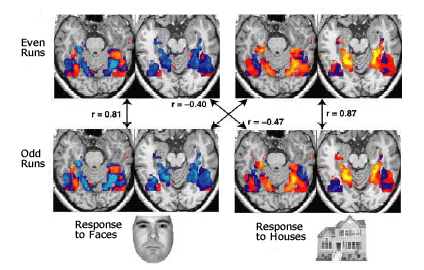|
Memory
Models
Psychologists
have developed models to conceptualize how cognition takes place
in the brain. These models can be useful in designing and assessing
tasks associated with human-to-system interfaces. Different theorists
have different models, and these models are subject to change as
more is learned about cognition.
Brain
imaging technologies are helping us to understand the functions
and interactions of different brain parts and to verify or refute
memory models. The human brain is highly complex, and we are still
learning about the mechanisms used to process, store, and retrieve
information.
| 
|
|
fMRI
Differing Response Patterns to "Faces" or "Houses"
in the Ventral Temporal Cortex of the Brain*
|
* National
Institute of Mental Health (NIMH) Research, Dr. James Haxby et al.
|










